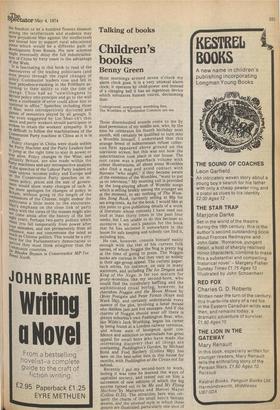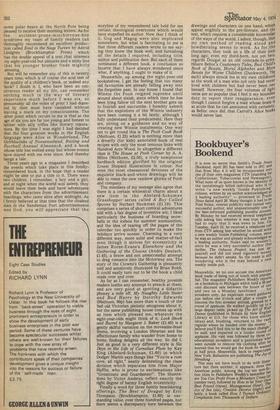Talking of books
Children's books
Benny Green
Most mornings around seven o'clock my alarm clock goes. It is a very unusual alarm clock; it operates by child-power and instead of a clanging bell it has an ingenious device which simulates human voices, declaiming thus: Underground, overground, wombling free, The Wombles of Wimbledon Common are we.
These disembodied sounds come to me by kind permission of my middle son, who, by the time he celebrates his fourth birthday next month, will certainly be qualified to turn into a Womble himself. I understand that this strange breed of subterranean refuse collectors first appeared above ground on the television screen, but this was not how the indoctrination took place in our house. The root cause was a paperback volume with colour illustrations, all about some Wombles who find a map and avoid contact with Humans "who might," if they became aware of the existence of the Wombles, "want to put us on television." My morning call is provided by the long-playing album of Womble songs which is selling briskly among the younger set at the moment, to say nothing of The Wombles Song Book, currently selling at 95p for ten song-texts. As for the book, I would like at this point to give publishing details of a work of literature whose contents I have read out loud at least thirty times in the past four weeks, but I am unable to do this because so excessive is my son's passion for the book that he has secreted it somewhere in the house for safe keeping and nobody can find it, including him. He can, however, console himself easily enough with the rest of his current folk heroes, of whom Noggin the Nog is pretty big at the time of going to press. The Noggin books are curious in that they vary so widely in their age-group appeal. The current paperback series, for instance, on sale in many stationers, and including The Ice Dragon and King of the Nogs, is far too mature for proxy-wombles like my second-born, who would find the vocabulary baffling and the sophisticated ritual boring; however, he cherishes Noggin and the Moon Mouse by Oliver Postgate and Peter Firmin (Kaye and Ward 55p), and certainly understands every nuance of the plot, involving a lunar mouse who dislikes jam and hot sausages. And if the charms of Noggin should wear off there is always suburbia's own Paddington Bear, who, like Wilde's Jack Worthing, began his career by being found at a London railway terminus, and whose aura of bourgeois quiet confidence and addiction to marmalade has great appeal for small boys who have made the interesting discovery that all things are everlasting. Paddington's Garden, by Michael Bond and Fred Banbery (Collins 60p) has been on the best-seller lists in this house for months, with Paddington at the Circus not far behind.
Recently I put my second-born to work, feeling it was time he learned the ways of capitalist society, and tested out on him a succession of new editions of which the big success turned out to be Me and My Flying Machine by Marianna and Mercer Mayer (Collins £1.25). The attraction here was certainly the charm of the small hero's fantasy dreams, and the unusual style in which these dreams are illustrated, particularly one shot of
some polar bears at the North Pole being pleased to receive their morning letters. As for the accident-prone-mischievous-boy syndrome my team of family readers can thoroughly recommend an excellent production called Emil in the Soup Tureen by Astrid Lindgren (Brockhampton Press) which has the double appeal of a text that interests my eight-year-old but pictures and a story line that his younger brother finds mightily amusing.
But will he remember any of this in twenty years time, which is of course the acid test of the quality of a children's book, or indeed any book? I doubt it. I, who have been an omniverous reader all my life, can remember nothing much in the way of literary experience much before I was six, so presumably all the miles of print I had digested by then must have vanished without leaving a mark on my consciousness. The her point which occurs to me is that at the age of six you are far too young and honest to bother with silly trifles like literary reputations. By the time I was eight I had decided that the four greatest works in the English language were Alice in Wonderland, The Gobbliwinks of Nonsenseland, Racing and Football Annual Almanack, and a book whose title has melted away but whose events have stayed with me ever since. And thereby hangs a tale.
Three years ago in a magazine I described the events which take place in this fondlyremembered book, in the hope that a reader might be able to put a title to it. There were two children, I remember, a boy and a girl, and at night when the world was asleep, they would leave their beds and have adventures with the characters from the advertisement hoardings, who came alive after midnight. As I firmly believed at that time that the cloaked man in the Sandeman Port advertisements was God, you will appreciate that the storyline of my remembered tale held for me certain theological overtones which would have stupefied its author. Now that I think of it, Gog and Magog were also implicated somewhere, but what is fascinating to me is that three different readers wrote to me say
ing they knew the book well, and furnishing all the details I required, including title,
author and publication date. But each of them nominated a different book, a conclusion so bizarre that I have always wondered since what, if anything. I ought to make of it.
Meanwhile, up among the eight-year-old bookshelves, I get the feeling that too many old favourites are already falling away into the forgotten past. In our house I found that Winnie the Pooh reigned supreme until around about sixish, since which time he has been lying fallow till the next brother gets up to fourish and succumbs. I humbly submit that the exploiters of the Winnie industry have been coming it a bit lately, although I fully understand their predicament. Here they are, sitting on a goldmine and no way of creating new Winnie instalments. One way not to get round this is The Pooh Cook Book (Methuen, £1.25) which is nothing more than a drearily (for kids) annotated book of real recipes with only the most tenuous links with Hundred Acre Wood. In altogether a different class is The House at Pooh Corner by A. A. Milne (Methuen, £2.50), a truly sumptuous hardback edition glorified by the original Ernest Shepard illustrations in colour. Not even the most obsessional devotees of the exquisite black-and-white drawings will be able to resist the new rainbow glories of Pooh and company.
The members of my menage also agree that there is a certain whimsical charm about a new item in the Abelard-Schuman Grasshopper series called A Boy Called Spoons by Herbert Heckman (£1.10). This comprises a series of short comical adventures told with a fair degree of inventive wit; I liked particularly the business of hoarding snowballs in the icebox for summer ammunition, and the idea of tearing off the pages of the calendar too quickly in order to make the holidays arrive sooner. Charming in a very different way, more solid and matter-of-fact even though it strives for eccentricity is James Roose-Evans's Elsewhere and the Gathering of the Clowns (Andre Deutsch, £1.45), a brave and not unsuccessful attempt to drag romance into the Motorway era. The story of the Clowns's Gathering is pleasantly told and sensitively illustrated by Brian Robb. It could easily turn out to be the book a child reads over and over.
As far as I can remember, healthy juvenile readers loathe any attempt to preach at them, and are very good at spotting a didactic phoney a mile off. My Naughty Little Sister and Bad Harry by Dorothy Edwards (Methuen, 90p) has more than a touch of the bad old Victorian pietistic smugness about it, but the same publishing house comes up with an item which pleased me, whatever the eight-year-olds might think of it. Lock Stock and Barrel by Margaret J. Baker (£1.40) is a gently skilful variation on the moveable-feast theme, involving a London librarian and his affectionate family who wander from home to home, finding delights all the way. So did I. Just as good in a very different style is Six Days in the Life of Cornelius Plum by Kay King (Abelard-Schuman, £1.60) in which Dodger Martin says things like "You're a rum cove, all right," neatly delineating the class division which separates him from Major Huffin, who is prone to exclamations like "Greatcoats and Guardsmen!". The illustrations by Victor Ambrus, reflect exactly the right degree of barmy English eccentricity. Finally a word for three faintly bewildering offerings. The Best of Dougal by Eric Thompson (Brockhampton, £1.60) is outstanding value, over three hundred pages, but there seems a discrepancy here between the
drawings and characters on one hand, which appeal mightily to the pre-literate, and the text, which requires a considerable knowledge of the ways of the world. I admit, though, that my own method of reading aloud and bowdlerising seems to work. As for the characters, they took on a life of their own long ago; even my third-born, not yet two, regards Dougal as an old comrade-in-arm Hilaire Belloc's Cautionary Tales, Bad Child s Book of Beasts, Moral Alphabet and More Beasts for Worse Children (Duckworth, 75P each) always struck me in my own childhood as the work of a man who not only had never lived with children but had never been one himself. However, the four volumes of light verse are so popular that I feel it my bounden duty to report their reappearance, even though I cannot forgive a man whose brain is so acute that he can announce with certainty, as Belloc once did, that Carroll's Alice books would never last.



































 Previous page
Previous page